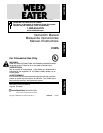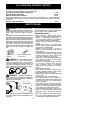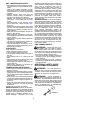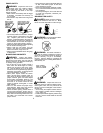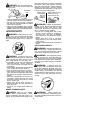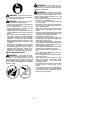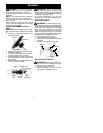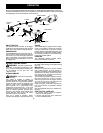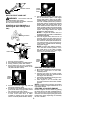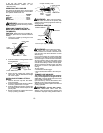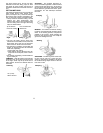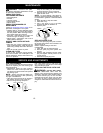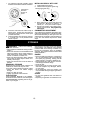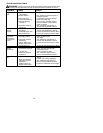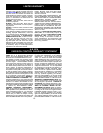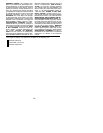
11
can cause serious injury. Do not use other
materials such as w ire, string, rope, etc. Wire
can break off during cutting and become a
dangerous missile that can cause serious in-
jury.
CUTTING METHODS
Useminimum speedand donotcrowd theline
when cutting around hard objects (rock,
gravel, fence posts, etc.), which can damage
the trimmer head, become entangled in the
line, or be thrown causing a serious hazard.
S
The tip of the line does the cutting. You will
achieve the best performance and
minimum line wear by not crowding the line
into the cutting area. The right and wrong
ways are shown below.
Tip of the Line
Does The Cutting
Right
Line Crowded Into
Work Area
Wrong
S
The line will easily remove grass and
weeds f romaround walls, fences, trees and
flower beds , but it also can cut the tender
bark of trees or shrubs and scar fences.
S
For trimming or scalping, use less than full
throttle to increase line life and decrease
head wear, especially:
S
During light duty cutting.
S
Near objects around which the line can
wrap such as small posts, trees or fence
wire.
S
For m owing or sweeping, use f ull throttle for
a good c lean job.
TRIMMING
-- Hold the bottom of the trimmer
head about 3 in. (8 cm) above the ground and
at an angle. Allow only the tip of the line to
make contact. Do not force trimmer line into
work area.
Trimming
3in.(8cm)
Above Ground
SCALPING
-- The scalping technique re-
moves unwanted vegetation. Hold the bottom
of the trimmer head about 3 in. (8 cm) above
the ground and atan angle. Allow thetip ofthe
line to strike the ground around trees, posts,
monuments, etc. This technique increases
line wear.
Scalping
MOWING
-- Your trimmer is ideal for mowing
in places conventional lawn mowers cannot
reach. In the mowing position, keep the line
parallel to the ground. Avoid pressing the
head into the ground as this can scalp the
ground and damage the tool.
Mowing
SWEEPING
-- The fanning action of the rotat-
ing line can be used for a quick and easy
clean up. Keep the line parallel to and above
the surfaces being swept and move the tool
from side to side.
Sweeping



